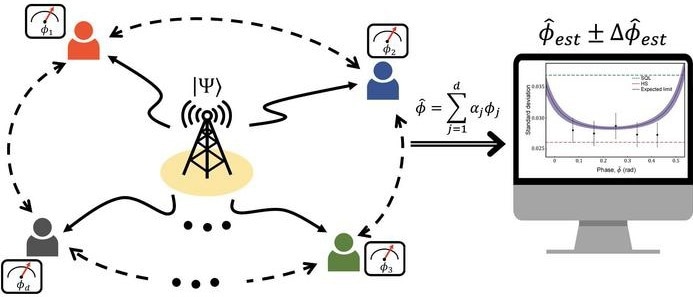
Send quantum states from a centralized location to each node distributed over a large area to obtain an average of the phases. Image Credit: Korea Institute of Science and Technology (KIST)
They have done this in partnership with top domestic and international research institutes like Chung-Ang University, the Korea Research Institute of Standards and Science (KRISS), the Agency for Defense Development (ADD), and the Oak Ridge National Laboratory (ORNL) in the United States.
Different clocks in two distant places can have their times more precisely measured, thanks to quantum phenomena like superposition and entanglement. Similarly, it is possible to share the entanglement state between Seoul and Busan and then measure the two physical quantities simultaneously with more accuracy than if you measure the physical quantities in Seoul and Busan separately if there are two physical quantities, one in Seoul and one in Busan.
‘Distributed quantum sensors’ are systems that can monitor dispersed numerous parameters across a vast area with better accuracy than traditional sensors. It is anticipated that quantum sensors would enable ultra-precise measurements that are not achievable with classical sensors.
In scenarios where the objects that need to be measured are dispersed across a vast area, distributed quantum sensing systems can be utilized to measure phenomena with the utmost accuracy possible using quantum mechanics, as the KIST research team has experimentally shown.
To attain the Heisenberg limit or the limit of quantum mechanical precision, the team experimentally created a superposed maximum entanglement state, a quantum entanglement state that concurrently exists in four places far from the Bell state.
We look forward to expanding into practical technologies such as global time synchronization and ultra-microscopic cancer detection by pioneering the core source technology for distributed quantum sensing, which enables measurements beyond the standard quantum limit with few resources.
Dr. Hyang-Tag Lim, Study Lead, Korea Institute of Science and Technology
KIST works with a variety of researchers from industry, academia, and research centers, including first author Seongjin Hong, a professor at Chung-Ang University, to acquire world-class source technologies in quantum applications, including quantum sensors, and then distribute them to industry.
Journal Reference
Kim, D.-H., et. al. (2024) Distributed quantum sensing of multiple phases with fewer photons. Nature Communications. doi:10.1038/s41467-023-44204-z